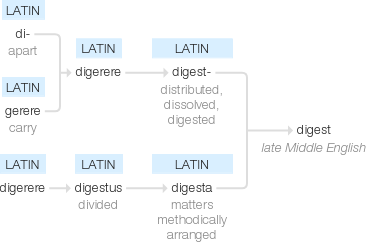Digest
late Middle English: from Latin digest- ‘distributed, dissolved, digested’, from the verb digerere, from di- ‘apart’ + gerere ‘carry’; the noun from Latin digesta ‘matters methodically arranged’, from digestus ‘divided’, from digerere .
wiktionary
From Middle English digesten, from Latin dīgestus, past participle of dīgerō(“carry apart”), from dī- (for dis-(“apart”)) + gerō(“I carry”), influenced by Middle French digestion.
From Latin dīgesta, neuter plural of dīgestus, past participle of dīgerō(“separate”).
etymonline
digest (n.)
late 14c., in reference to Justinian's law codes in ancient Rome, from Late Latin digesta, from neuter plural of Latin digestus, literally "digested thing," noun use of past participle of digerere "to separate, divide, arrange," etymologically "to carry apart," from dis- "apart" (see dis-) + gerere "to carry" (see gest). General sense of "collection of writings (literary, legal, scientific or historical) arranged under different heads" is from 1550s.
digest (v.)
late 14c., digesten, assimilate (food) in the bowels," also "divide, separate; arrange methodically in the mind," from Latin digestus past participle of digerere "to separate, divide, arrange," etymologically "to carry apart," from dis- "apart" (see dis-) + gerere "to carry" (see gest). Meaning "assimilate mentally" is from mid-15c. Related: Digested; digesting.
